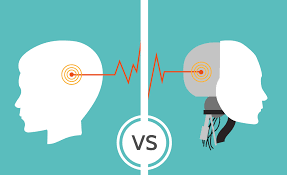1482Views

Artificial Intelligence Vs Human Intelligence
Artificial Intelligence (AI) is a term used to describe the simulated intelligence demonstrated by machines. AI systems are capable of performing tasks that typically require human cognitive abilities—like reasoning, learning, problem-solving, and even language understanding. Whether it’s through virtual assistants, self-driving cars, or chatbots, AI is taking over more and more functions in our daily lives.
It’s easy today to marvel at how quickly AI is progressing. It executes tasks on command, learns from data, and seems almost human in certain interactions. But as AI continues to evolve, an important question arises: Where does that leave human intelligence?
While AI impresses with speed and accuracy, comparing it directly with the human mind misses a crucial point—these two forms of intelligence are fundamentally different. AI is built to replicate specific patterns and behaviors based on data. It can follow instructions, identify trends, and even learn from its mistakes through algorithms like Machine Learning (ML) and Deep Learning (DL). But at the core, AI lacks something that defines human intelligence—consciousness and emotional understanding.
What Sets Human Intelligence Apart?
Human Intelligence is the natural cognitive ability that allows us to learn from experience, adapt to new environments, and make decisions based not just on logic but also on emotions, values, and ethics. It encompasses everything from critical thinking and memory to creativity and empathy.
For example, a toddler can quickly learn how to stack blocks or understand facial expressions, while it takes AI systems years of training, programming, and massive datasets to perform even slightly comparable tasks.
Humans are also capable of moral judgment, creative expression, and understanding abstract ideas. We can connect dots between unrelated ideas, navigate ethical dilemmas, and feel love, fear, and compassion—traits AI, despite all its processing power, cannot authentically replicate.
Where AI Excels?
This isn’t to say AI doesn’t have its strengths. In fact, AI surpasses human capabilities in several domains. It can:
- Process vast amounts of data in seconds
- Perform repetitive tasks without fatigue
- Identify patterns invisible to the human eye
- Learn from historical data to predict outcomes
These abilities make AI valuable in industries like healthcare, finance, manufacturing, and customer service, where efficiency and data processing are paramount.
For instance, in medical diagnostics, AI algorithms can scan thousands of X-rays and detect abnormalities with incredible precision. In stock trading, AI systems monitor the market in real-time and make high-speed decisions. These are areas where human speed and memory simply can’t compete.
Complementary, Not Competitive
Rather than viewing AI as a competitor to human intelligence, a better perspective is to see them as complementary forces. While AI can crunch numbers and automate routine tasks, human intelligence brings creativity, intuition, and emotional sensitivity to the table.
In workplaces of the future, the most successful environments will likely be those where humans and AI collaborate, with each making up for the other’s limitations. For example, AI can analyze customer data and predict preferences, while a human marketing professional uses those insights to create emotionally resonant campaigns.
The fusion of emotional intelligence (EQ) and artificial intelligence (AI) is where true innovation lies.
The AI-Human Intelligence Debate in the Job Market
One of the biggest concerns today is how AI might affect jobs. There’s no denying that automation is reshaping the labor market. Many routine or manual jobs are being phased out. However, this doesn’t mean humans are becoming obsolete.
Instead, the demand is shifting toward roles that require creative thinking, people management, leadership, innovation, and decision-making under uncertainty—skills that are uniquely human.
To thrive in this new world, professionals need to develop both technical skills and soft skills. Understanding how to work alongside AI, analyze its output, and use it effectively is becoming just as important as being emotionally intelligent and collaborative.
Why Will Human Intelligence Always Matter?
AI may help build systems, but humans are the ones who ask questions, dream big, and set direction. We are the creators of AI and will remain the drivers of innovation. A machine can mimic human behavior, but it cannot replace the depth of human experience.
Humans are capable of empathy, ethics, and consciousness, all of which play a crucial role in leadership, education, healthcare, and society at large. No matter how advanced AI becomes, the human touch will always hold value.
AI cannot comfort a grieving friend, write a poem from the heart, or decide what’s ethically right in a morally gray situation. These things require more than algorithms—they require a soul.
How Vivekanand Business School (VBS) Equips Future Leaders for the AI Era?
At Vivekanand Business School (VBS), Mumbai, the focus is not only on understanding cutting-edge technologies but also on developing the leadership, empathy, and critical thinking needed to thrive in a world where AI and humans work together.
The institute’s experiential learning pedagogy ensures students aren’t just absorbing theory—they’re solving real business problems, working on live projects, and engaging in collaborative learning. VBS’s Guru Shishya Program offers personalized mentoring that helps students evolve as both professionals and individuals.
As one of the best PGDM colleges in Mumbai, VBS offers specializations in Business Analytics, Marketing, HR, Finance, and Operations, all designed with industry needs in mind. The curriculum nurtures a future-ready mindset, preparing students to embrace innovation, lead with empathy, and adapt to change.
If you’re looking to pursue a PGDM in Mumbai and become a leader who can navigate both human and artificial intelligence with confidence, VBS offers the ideal launchpad.
Vaishnavi Wagh
PGDM Batch: 2020-2022
Vivekanand Business School


